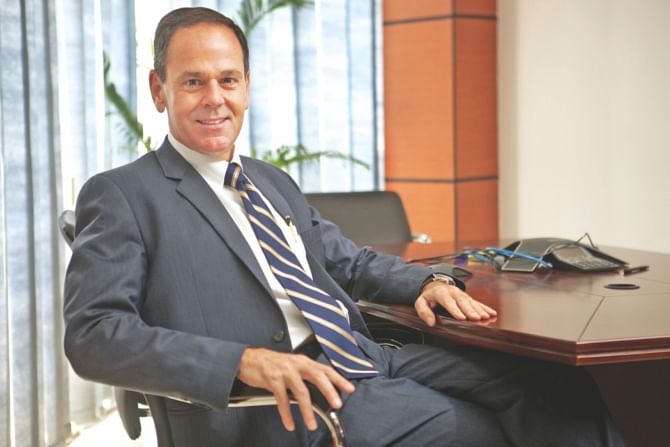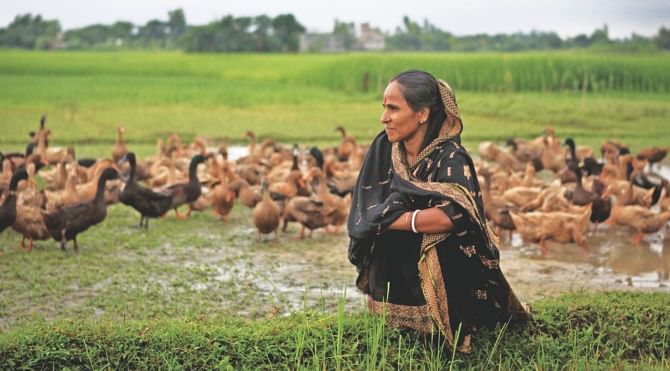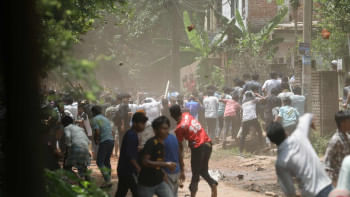Chevron launches $10m CSR scheme

Chevron Bangladesh has recently launched a $10-million corporate social responsibility programme that aims to help local people in its work area in Sylhet create their own small business and learn skills to get jobs.
“We have learnt in our operations around the world—the success of our business depends on the success of local communities where we operate,” said Geoff Strong, chief of Chevron Bangladesh in an interview with The Daily Star at his Dhaka office recently.
The largest foreign investor with an investment of $1.5 billion and also the largest corporate tax payer in Bangladesh, the US oil company has been involved with CSR activities in Bibiyana, Moulvibazar and Jalalabad where it has gas field operation from the middle of the last decade. The company has so four touched 30,000 people through economic development schemes, education and healthcare.

“Economic development has always been a core focus of our social investments, and we are very excited about a new programme we call the Bangladesh Partnership Initiative that we have just launched,” Strong said.
“Chevron recently identified the opportunity to help the local communities around our operations to participate more in the success of our business. The programme will build on Chevron's past partnership initiatives and programmes. Bangladesh is one of four worldwide locations that were selected across Chevron's global operations for major economic development programmes,” he said.
Over the next five years, Chevron will work with local and international non-government organisations to establish enterprise and workforce development programmes. It would also partner with the government and private enterprises.
Strong said the new CSR initiative would expand Chevron's existing alternative livelihood and village development organisation programmes that provide micro loans to local businesses. “We have a strong foundation in place but are committed to increasing the impact, inclusivity and sense of ownership by the communities,” he said.
“When we started developing our Moulvibazar and Bibiyana gas fields in 2004-2006, our study showed that more than one-third of all households were living below the poverty line."
These were predominantly agrarian communities in an area with virtually no industrial presence. So, with challenging socioeconomic conditions come huge expectations to support them to improve their lives, he said.
"They all want to share in the economic benefits of our operation. We think it is an opportunity to be part of their success," Strong said.
"Chevron has been making social investments by working with our strategic partners in three core areas of economic development, education and health."
In the area of health, 130,000 patient services are provided to local communities per year through three Chevron-sponsored Smiling Sun clinics. On education, Chevron has provided 1,500 scholarships per year and support to 60 schools in partnership with Save the Children.
"More than 5,500 families are currently engaged with our economic development programmes, and more than 2,000 new enterprises have been created since 2006,” he said.
“Chevron is the largest producer of natural gas in Bangladesh, currently delivering around 50 percent of Bangladesh's total supply. We have increased production from 300 mmcfd in 2005 to more than 1.1 bcfd currently to meet Bangladesh's increasing demand for natural gas.”
Chevron's efforts to partner with the community are not limited to social investment. The company has also been helping local communities share in the success of its operations through local content. “We currently provide employment opportunities to around 1,200 local workers on the Bibiyana expansion project and spend an average of more than Tk 30 million a month on goods and services with local businesses,” he said.
The Chevron chief said the company focuses on economic development because that empowers the community to help itself. “From our experience, we have seen that when we improve economic conditions, families can provide better education opportunities for their children and take care of their own health services. We see economic development as a conduit to improvement in education and healthcare."
Responding to the question whether $10 million is enough for such a CSR programme, he said, “We have learned that success depends, less on the amount of money we inject, and more on the successful execution of the programmes. Our Bangladesh Partnership initiative will provide not only funding, but more importantly Chevron management of the programmes to ensure they are successful.”
“Making social investments sustainable is a hard work. It's easy to write a cheque. It's much harder to carefully understand the needs of a community, and set up programmes that will continue to deliver benefits well after Chevron's funding is complete. That's exactly what we plan to achieve with the Bangladesh Partnership Initiative.”
Chevron is currently implementing the Bibiyana expansion project to increase gas supplies from this large field from the yearend.
“This $500-million flagship project, one of the largest foreign investment projects in Bangladesh's history, is critical for the country's energy security. Once fully operational in 2015, the project will deliver an additional 300 million cubic feet of natural gas per day, and 4,000 barrels of condensate. Since 2011, we have drilled 11 new development wells at Bibiyana, with plans to complete three more this year."
The other key project is Chevron's Jalalabad drilling programme. Jalalabad is currently the third largest producing field in Bangladesh. "We are investing to further increase production from the field to meet Bangladesh's growing demand for low-cost, home-grown energy. We plan to drill three new development wells in Jalalabad by early next year,” Strong said.

 For all latest news, follow The Daily Star's Google News channel.
For all latest news, follow The Daily Star's Google News channel. 



Comments